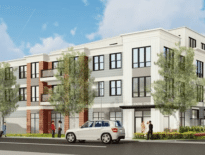Prices are ballooning, unit construction is stagnating, populations are declining, and a housing crisis deserves to be treated as such, the Barnstable County Assembly of Delegates declared on Wednesday.
The regional legislative body voted 14-1, which counts as 79 percent to 21 percent because the delegates’ votes are weighted by their town’s population, in favor of a resolution declaring a housing crisis on Cape Cod. With limited county powers, the resolution is both a symbolic gesture and an earnest effort to contribute something to the housing crisis hitting the Cape and Islands especially hard.
Cape Cod is in a grim bind, with seasonal housing contributing to a worsening housing and workforce shortage.
Some 86 percent of the Cape’s land is already developed, the resolution asserts, and the median price of a single-family home on Cape Cod has surged from $449,000 in 2019 to $730,000 in 2023. A working family must earn almost two-and-a-half times the area’s median income to afford a median-priced new home, according to the resolution.
“This place that we call home – this place that so many of us were lucky enough to be born into or to have found and fallen in love with – is slipping through our fingers,” said resolution co-sponsor Daniel Gessen, the deputy speaker and Falmouth delegate, during the assembly’s general meeting. “We spent decades building a fortress that does everything in its power to protect property values. And in doing so, we’ve locked out the same people that we sought to create our communities with. The result is a community that is being quietly, but relentlessly, hollowed out.”
The resolution will now be presented to the Barnstable County Board of Regional Commissioners – the county executive body – for consideration. It asks the Cape Cod regional government administrator, overseen by the commissioners, to convene housing, environmental, and municipal stakeholders to develop “actionable recommendations” on how the county can best address housing challenges.
Without action, Gessen said, “Cape Cod’s going to become a place where the help drives in over the bridge, and the heart’s long moved off to the other side. A place where neighbors have lost neighbors, and a place where my generation just isn’t going to be able to fathom starting a family.”
He told the State House News Service earlier this week that some possible options include allowing deed restrictions, creating a county-run year-round housing trust, implementing a buy-down program, creating revolving fund loans for housing similar to how state loans help address costs of sewer infrastructure on Cape Cod, and home rehabilitation programs to keep long-time residents in houses they may not be able to keep up.
Most county governments in Massachusetts are defunct, with only six of the state’s 14 counties still maintaining some kind of regional government body. Barnstable County, which is the ninth most populated county in the state, covers 15 towns and formalized its county governance structure and powers in a 1988 home rule charter.
The county government enacts ordinances and deploys a budget funded by real estate sale excise taxes, town assessments, and grants to offer services across municipal lines. In May 2024, the Cape Cod Commission, which is part of the county government, released a regional housing strategy that recommended options like allowing accessory dwelling sales for affordable housing, offering developer density bonuses, and creating short-term rental regulations.
Active county government on the Cape has allowed for a more unified voice when advocating for regional interests, but some delegates still wonder what the point would be of adopting the housing crisis resolution.
“This resolution needs more work,” said Barnstable delegate Frank Fredrickson, who cast the sole opposing vote. “There’s a shortage of housing and the county needs to assist our communities without being too bureaucratic,” he said.
Fredrickson supported continuing the work of a shared regional housing office program, a two-year pilot that offers technical assistance for housing-related initiatives. The program is funded by American Rescue Plan Act money until the end of June.
Twelve of the 15 county towns have already agreed to pay for the shared regional housing office services, said Chatham delegate and Speaker Randi Potash, noting that it does not require identical action in all municipalities.
“Of course we don’t have money for this right now,” Potash said of the current resolution, “but this is a vehicle to explore what else the towns would be interested in paying for.”
The declaration is another layer in a patchwork of strategies to tackle the housing shortage across the state, but particularly in regions watching their home prices rise because vacation rentals are squeezing out full-time residents..
Gov. Maura Healey said the state must add 222,000 new units across Massachusetts in the next 10 years to meet demand, a goal that was detailed in a housing report released before the Trump administration’s tariffs upended the supply chain.
“It won’t happen without a lot of work or a lot of effort,” said housing Secretary Ed Augustus on The Codcast in late March, as the world readied for market and supply chain shocks from President Donald Trump’s trade war. The Affordable Homes Act – a sprawling housing bond bill signed in August 2024 – is projected to unlock about 65,000 units, Augustus said, if favorable conditions hold.
“We’ve got some headwinds coming from the federal level that are going to slow us down in some cases and make units cost more in other cases,” he said. “We’re going to have to manage through that. We can only control what we can control at the state level.”
The state is leading a broad spectrum of efforts to increase housing production, an Executive Office of Housing and Livable Communities spokesperson said Thursday.
One newer mechanism for addressing the unique intersection of the housing crunch and seasonal communities is through the Seasonal Communities Advisory Council, which was established through the Affordable Homes Act. The council, which includes representatives from Cape Cod regional government, is tasked with making policy recommendations for specific areas where seasonal homes are a significant portion of the housing stock and significant disparities between area median income and the income required to purchase the municipality’s median home price.
The seasonal communities task force is in the middle of a working group phase expected to last though May to develop recommendations. After public comment and revisions periods, the group plans to release final regulations in September.
Some state tools that could be made available to seasonal communities though this process, which might align with regional recommendations, include tiny homes by-right, allowing use of undersized lots, developing housing targeted at municipal employees, and offering primary residence property tax exemptions.
That the Barnstable County regional government is just one piece of the puzzle – and not a determining one – shouldn’t be a reason to sit back, some assembly delegates said on Wednesday. The assembly’s committees can take some small, focused actions, said delegate Karl Fryzel of Brewster.
“A problem that cannot be solved by any one body or entity and cannot be solved in any short period of time sometimes overwhelms us to the point we get paralyzed and do nothing,” he said. “That’s the wrong answer. The right answer is to try to do something, even if the something isn’t the magic bullet that’s going to all of a sudden cure this whole problem.”
This article first appeared on CommonWealth Beacon and is republished here under a Creative Commons Attribution-NoDerivatives 4.0 International License.![]()






